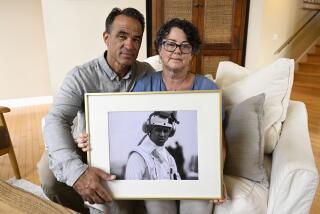Soldier Turns Himself In at Base in Japan
- Share via
CAMP ZAMA, Japan — Standing stiffly at attention and rendering a long salute to a commanding officer, alleged Army deserter Charles Robert Jenkins reported back for duty today, coming in from the cold of a long unauthorized absence spent in North Korea.
He was almost 40 years late.
Jenkins, 64, presented himself voluntarily to Lt. Col. Paul Nigara, the provost marshal -- or senior military police officer in Japan -- at Camp Zama, a U.S. military base west of Tokyo. The diminutive sergeant has been classified as a deserter since 1965, when he vanished across the demilitarized zone between North and South Korea.
“Sir, I’m Sgt. Jenkins and I’m reporting,” he said to Nigara, holding a firm salute.
“You are now under the control of the U.S. Army,” Nigara told him.
Jenkins’ return to U.S. military jurisdiction means he is closer to providing answers to his superiors about why he slipped away from his four-man unit while on patrol one January night, and why he subsequently engaged in virulent propaganda on behalf of the North Korean regime.
In addition to being charged with desertion, Jenkins faces three charges related to anti-American activities while inside North Korea.
But he has also become a figure of some sympathy in Japan, by virtue of being married to Hitomi Soga, a Japanese who was kidnapped by North Korean agents in 1978 and held in the communist state until two years ago. Jenkins and Soga met and married in North Korea, and their attempt to live together in Japan has captivated the country and its media.
His return to the U.S. military was covered extensively by Japan’s media.
Jenkins was accompanied to his formal surrender by his wife and their two Korean-born daughters. The family was driven to Camp Zama from the Tokyo hospital where Jenkins spent several weeks recovering from fatigue and preparing his legal defense.
He looked far fitter on his arrival at Camp Zama than he did when he landed in Tokyo on July 18, nine days after leaving North Korea. On that occasion, a badly bent Jenkins walked with the aid of a cane and his wife’s helping hand.
On Saturday, he almost hopped out of the minivan that brought him to the base. He allowed a crease of a smile to the calls from reporters, then walked in a bowlegged gait to present himself to Nigara.
Within minutes of reporting for duty, Jenkins followed Nigara into a military building, snapping off another salute to Capt. James Culp, his military defense lawyer.
Once inside, Jenkins was “in-processed” back into the military, swapping his gray business suit for military fatigues.
He also went back onto the Army payroll, though he is not eligible for back pay.
He and his family will live on the base while his legal case unfolds. In the only interview he has given from the hospital, Jenkins told the Far Eastern Economic Review that he wanted to meet with military officials to “clear his conscience,” and suggested that he might plead guilty to one of the four charges against him -- though he did not specify which one.
That statement reinforced the widespread belief that Jenkins’ surrender was the preamble to a plea bargain. It appears possible that Jenkins will accept a dishonorable discharge in return for acknowledging at least some guilt.
His aim throughout, he has made clear to the Japanese government, is to avoid jail time.
The case has caused an awkward hitch in the U.S.-Japanese relationship. The Bush administration has made clear that it wants to see its military principles upheld, whereas the Japanese government has put enormous effort into trying to ensure a happy ending to the family’s saga.
More to Read
Sign up for Essential California
The most important California stories and recommendations in your inbox every morning.
You may occasionally receive promotional content from the Los Angeles Times.













